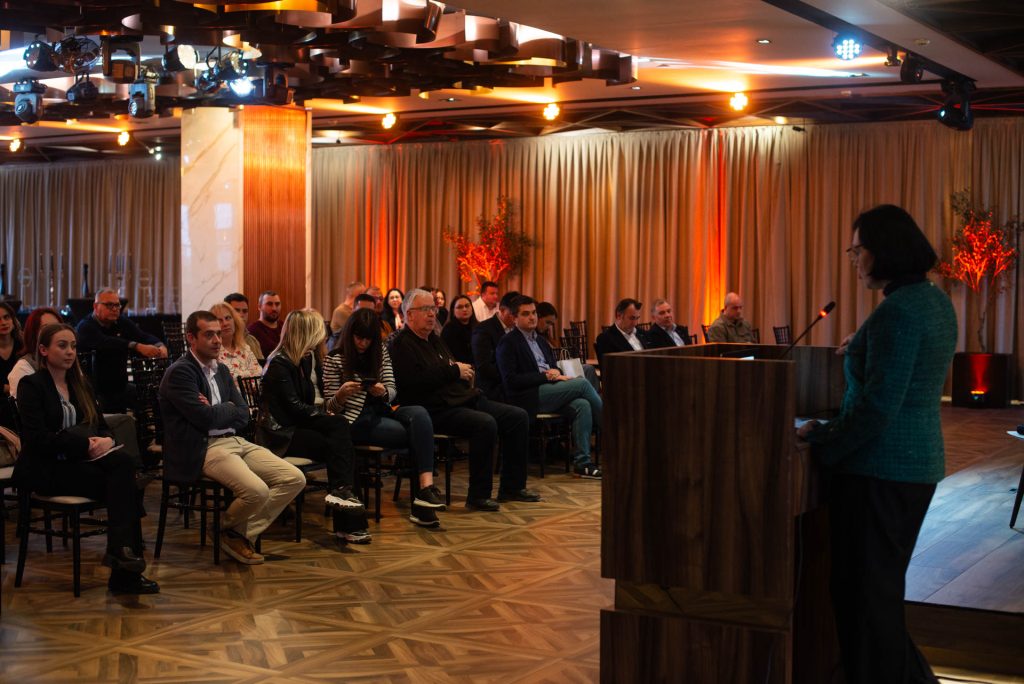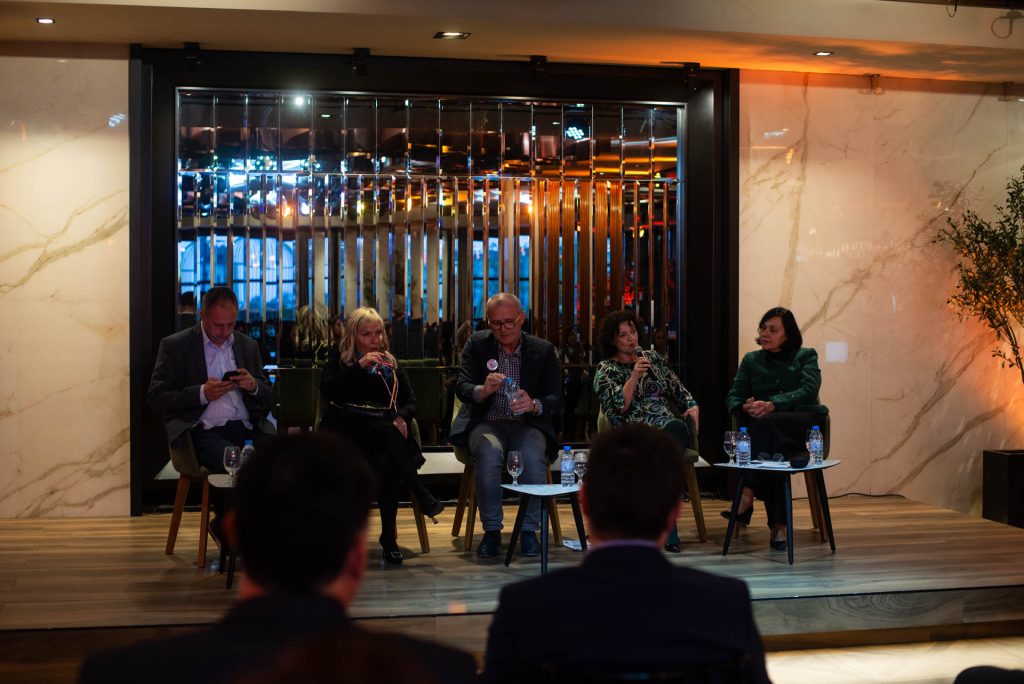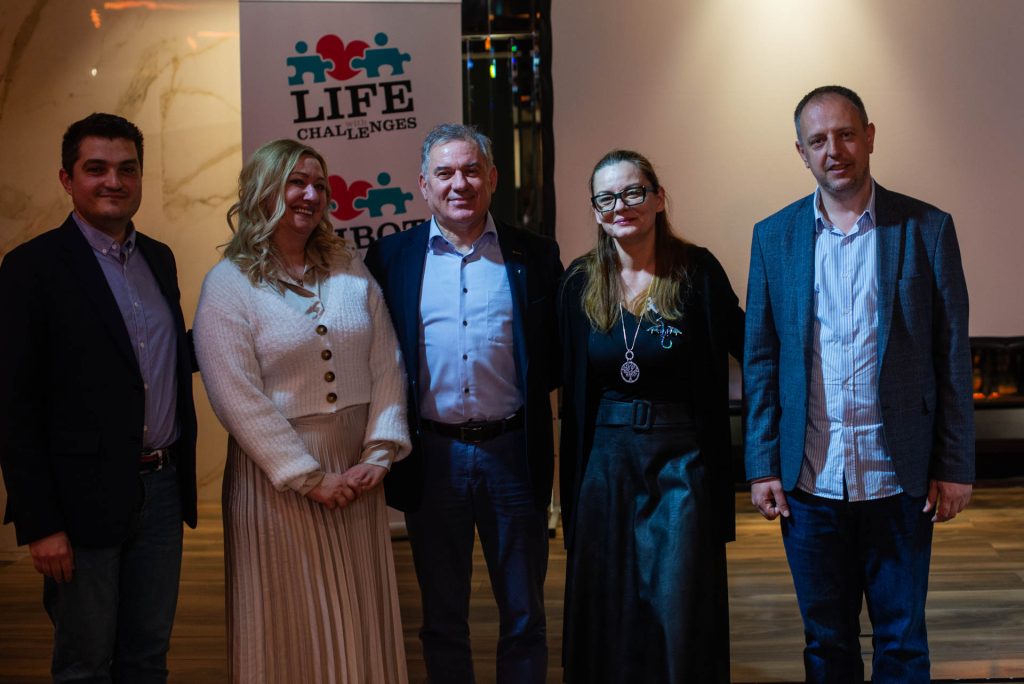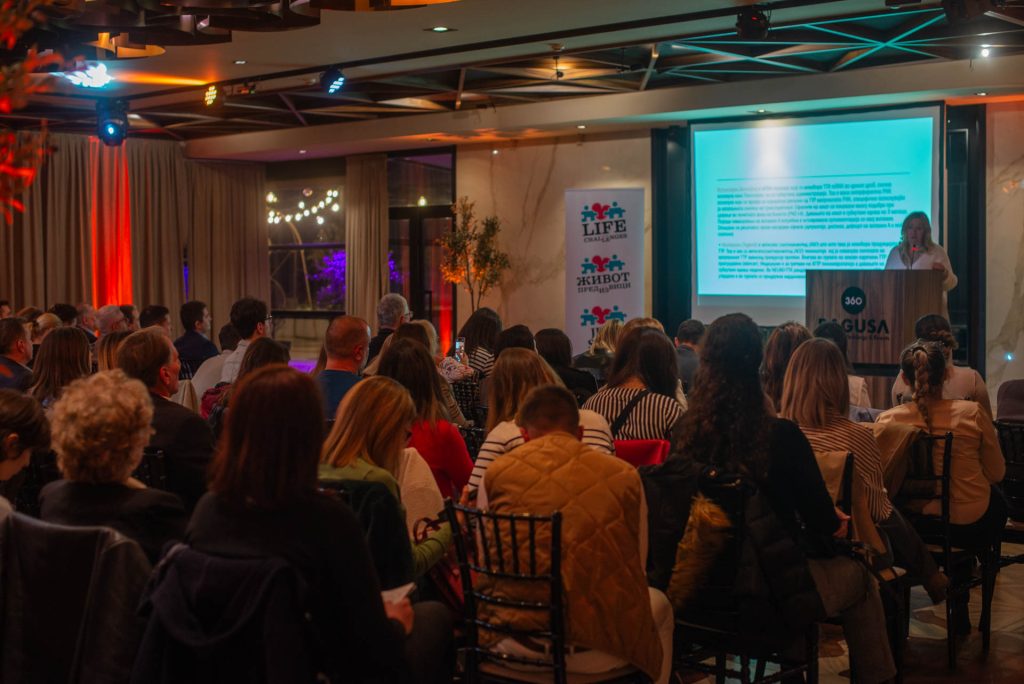
Discussion on gene therapy and an educational symposium on rare diseases
The Citizens’ Association for Rare Diseases LIFE WITH CHALLENGES Bitola is organising two consecutive events on March 12, 2025, at the “Raguza 360” Restaurant in Skopje. To better familiarise patients and their families with rare diseases and gene therapy, we organised a brief discussion and promoted a brochure on the topic. The brochure was created in cooperation with the associations STOP SMA, Duchenne Muscular Dystrophy Association, Familial Amyloid Polyneuropathy Association, and It’s Rare to Be Rare Ohrid. It is available for download at the following link:
https://drive.google.com/file/d/1_TklFneSzItzYqQOhs5vo-40kUkHeMv5/view

Vesna Aleksovska, president of LIFE WITH CHALLENGES, emphasised that this is the first event where we talk about gene therapy and in the future we will organise other discussions regarding gene therapy, gene testing, preimplantation and prenatal testing, genetic counselling and many other aspects related to genetics. The future of genetics can help a lot and the research that is underway gives hope for many diseases that are currently incurable and for which there is no therapy. Although at first glance gene therapy is more expensive, in the long run it will save money in terms of the budget of rare diseases, especially when it is given once and promises results that give a chance for a normal life. The brochure we created is a tool for patients and families in order to better understand the ways in which gene therapy works, its benefits and risks.
The discussion was led by Prof. Dr. Dijana Plasheska Karanfilska, Research Centre for Genetic Engineering and Biotechnology, Macedonian Academy of Sciences and Arts, who emphasised the importance of such discussions for the advancement of genetic testing and counselling. This year, the budget for genetic testing has also been increased, which will contribute to more patients having access to this service, and she also mentioned the introduction of a new service in the near future – pre-implantation genetic testing, which will be a progress and hope for more families.
Prof. Dr. Todor Arsov emphasised the importance of genetic testing for gene therapy, spoke about genetic counselling and appropriately explained the ethical aspect of the topic.
Prof. Dr. Svetlana Kocheva, University Clinic for Children’s Diseases – Skopje, spoke about the current possibilities for the treatment of beta thalassemia major, the number of patients in our country and the available therapies, and explained the new possibilities for gene therapy.
Prof. Dr. Aspazija Sofijanova, University Clinic for Children’s Diseases – Skopje, gave an overview of spinal muscular atrophy, how it is treated in our country, the possibility of newborn screening which is expected to be introduced and gave an example of gene therapy in spinal muscular atrophy, which is closest to us being applied in Kosovo.
Assistant Professor Dr. Danilo Nonkulovski, University Clinic for Children’s Diseases – Skopje, spoke about patients with Duchenne muscular dystrophy in our country, how the disease is treated, the need for physical therapy and appropriate aids for patients, and gave an overview of gene therapy in Duchenne muscular dystrophy.

As part of the campaign “YOU ARE A RARE HERO”, the Citizens’ Association for Rare Diseases LIFE WITH CHALLENGES Bitola and the Association of General – Family Medicine Physicians ZLOM SM in cooperation with the Commission for Rare Diseases at the Ministry of Health organized an educational symposium entitled “Rare Diseases: Let’s Recognize the Unusual”, for family medicine physicians to recognize symptoms of rare diseases and appropriate referral for diagnosis and treatment.
Over a hundred doctors attended the event, and all left with educational materials describing symptoms of 12 different rare diseases. The event was opened by Dragan Gjorgjievski, President of ZLOM SM, who emphasised the importance of cooperation in education and advocacy for a better healthcare system.

Last year, with Life with Challenges, we visited 10 cities (Bitola, Prilep, Ohrid, Struga, Resen, Gevgelija, Veles, Strumica, Sveti Nikole, Kriva Palanka) in cooperation with the HEPAR Centre Bitola association, and It’s Rare to Be Rare – Ohrid. This year, we will continue with the campaign. Individual meetings with doctors give us the opportunity to discuss in more detail the recognition of rare diseases, the patients they refer to you, the referrals in order to register in the rare disease registry, the problems they face, and further cooperation in advocating for improving the conditions in the healthcare system with the aim of better healthcare for all citizens in our country.
Dr. Zlate Stojanoski, as the president of the rare diseases commission, gave an introductory speech about rare diseases in our country. The rare diseases program began in 2009, with three patients and a small budget. Today, the registry includes 968 patients, with 70 different diagnoses, 200 of whom are children under 14 years of age. Today, 346 people are being treated through the rare diseases program. The program’s budget has increased significantly, and while in 2017 it was 213 million denars, in 2025 it will exceed 1,250,000,000 denars. The next step is the adoption of a strategy for rare diseases in order to plan the future of rare diseases and improve the quality of life of families. The cooperation of institutions, medical professionals and associations is key to moving forward.
The program at the educational symposium was as follows:
• Early diagnosis, management and therapy of Myelofibrosis: Specialist Doctor, Zlate Stojanoski, internist-haematologist, University Clinic for Haematology – Skopje, President of the Rare Diseases Commission.
• Early diagnosis, management and therapy of Familial Amyloid Polyneuropathy: Professor Dr. Dragana Petrovska-Cvetkovska, specialist neurologist, former president of the Macedonian Neurological Association, head of the department for prevention and early diagnosis of cerebrovascular diseases, University Clinic of Neurology – Skopje, member of the Commission for Rare Diseases
• Early diagnosis and monitoring of people with Alport syndrome: Associate Professor Dr. Pavlina Dzekova Vidimliski, University Clinic of Nephrology – Skopje, member of the Commission for Rare Diseases
• Early diagnosis of Duchenne Muscular Dystrophy and the latest therapeutic options: Assistant Professor Dr. Danilo Nonkulovski, head of the department for neurology, epilepsy and neurological development, University Clinic for Children’s Diseases – Skopje, member of the Commission for Rare Diseases
The conclusion is that educational events should take place more often in order to strengthen primary and secondary healthcare in terms of recognition and appropriate referral of patients with rare diseases. Early diagnosis and early treatment are key to a better quality of life for families with rare diseases.
The next event is already planned for November 11, 2025, at Ragusa 360.

As an association, we will continue to advocate for a better life for families with rare diseases. Some need therapy and health services and their dispersion across regional centers, some need improved access to social services and the creation of new services that respond to the burden of the disease, some need better conditions and access to physical therapy and appropriate aids, some need centers or group homes … each rare disease has its burden and individually has many different challenges that need to be overcome.
We continue to advocate for the quality of life that families with rare diseases deserve.
